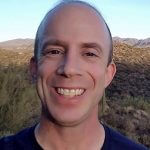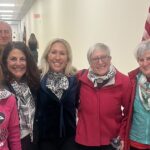
Few would argue that America is going through some challenging times at the moment, but it just might be the gateway to revival and, God-willing reformation.
People are looking for hope and many are starting to find it in Jesus and pockets of revival are beginning to break out throughout the country.
The most prominent example of this was at Asbury University in Kentucky in February, when tens of thousands poured into a small college town to experience God’s presence on a 24/7 basis for weeks on end.
Interestingly, in the very same month in 1970, a similar outpouring happened at Asbury during the heart of the Jesus People movement.
💀 🏴☠️ PIRATE’S COVE
The waters of baptism signify death to living for ourself, and raising to new life with Christ.
Here are some pictures from the largest baptism in US history which took place yesterday at Pirates Cove, the historic site of the Jesus Movement in Southern… pic.twitter.com/cWyW677SlW
— Matt Brown (@evangelistmatt) July 9, 2023
The film “Jesus Revolution,” released in February, portrayed this turbulent, yet powerful time in American history.
No one can be sure how many came to faith in Christ during that era during the late 1960s and early 1970s, but estimates put it in the hundreds of thousands and perhaps millions.
What a difference 5 years makes. In 1966, Time asked, “Is God Dead?,” then in 1971 Time ran “The Jesus Revolution” cover after revival had broken out nationwide during the #Jesus movement.
Is the same happening in our day? #Asbury had a big-time revival back then too. pic.twitter.com/vIohLk3t5S
— Randy DeSoto (@RandyDeSoto) February 21, 2023
The Western Journal spoke with four Christian leaders who came to faith or were greatly impacted by the Jesus People movement, and one thing they agreed on is that the biggest lament is that it did not move from a revival into a broader societal reformation.
Ché Ahn — pastor of Harvest Rock Church in Pasadena, California, and head of Harvest International Ministry, who became a Christian during the Jesus People movement — is the author of “Turning Our Nation Back to God: Through History Revival.”
Ahn points to two examples of U.S. revivals that resulted in societal reformation.
The first was the Great Awakening, which began in the late 1730s in New England and spread throughout the 13 colonies over the next decade fueled by the itinerant preaching of George Whitefield among others.
#OTD May 3, 1738
English preacher George Whitefield, 23, first arrived in America. In all, Whitefield crossed the Atlantic 13 times, and died in Massachusetts in 1770, during his seventh visit.
In his lifetime, Whitefield preached at least 18,000 times to approx 10M hearers. pic.twitter.com/4P6mxWPj0z— ☧ Today in Christian History (@HistoricalRook) May 3, 2023
“And because he was also preaching liberty and freedom…it led, I believe, to the Declaration of Independence in 1776,” Ahn said.
Benjamin Franklin, who helped draft the Declaration, was a big fan and business partner of Whitefield, publishing book compilations of his sermons.
Franklin wrote in his autobiography that he once conducted an experiment to estimate how many people could hear Whitefield’s booming voice. During an outdoor gathering in Philadelphia, he kept backing away until he could no longer hear the preacher and then calculated the number of people who could be within earshot was over 30,000.
Franklin wrote of the impact of the Great Awakening, “It was wonderful to see the Change soon made in the Manners of our Inhabitants; from being thoughtless or indifferent about Religion, it seem’d as if all the World were growing Religious; so that one could not walk thro’ the Town in an Evening without Hearing Psalms sung in different Families of every Street.”
The Second Great Awakening in the U.S., which began around 1800 and lasted until the 1830s, helped launch the abolition movement that led to the end of slavery.
During the Civil War, Abraham Lincoln would sign the Emancipation Proclamation freeing the slaves in the southern states then in rebellion against the U.S.
The Republican-led Congress would follow that up with the 13th, 14th, and 15th amendments freeing all the slaves, and guaranteeing them equal protection under the law and the right to vote.
“And so revival led to the transformation of America, ending slavery and giving rights to all people,” Ahn said. “And so you see the foundation of revival leading to reformation of society, reforming institutions like the government, education, obviously, business. Every sector of society was transformed.”
[embedded content]
Ahn observed that during the Jesus People movement in the late 1960s and early 1970s, the harvest of new converts to Christianity came in, but reformation did not follow due to “bad eschatology,” i.e., teaching about the end times described in the Bible.
“So that eschatology is that things will get worse and then Jesus rapture us out of here,” he said.
“That is not the theology of the early church fathers or the reformers of 1517 [Protestant Reformation] or the Great Awakening of [Charles] Wesley, [George] Whitefield or Charles Finney in the Second Great Awakening in 1801,” Ahn continued. “They believed that you could transform America.”
Ahn noted Hal Lindsey’s book “The Late Great Planet Earth” (1970) was the No. 1 nonfiction bestseller of the decade. Its central message was that end time Bible prophecy was coming true as evidenced by the rebirth of Israel in 1948.
Lindsey also pointed to the turmoil on the earth at the time with the menacing Soviet Union during the Cold War and the potential for World War III, famines, earthquakes, and general societal unrest as evidence the return of Christ was near.
The time period was also marked by anti-Vietnam War protests, race riots, and a general questioning by the youth of the previous generation’s traditional values.
Michael Maiden — pastor of Church for the Nations in Phoenix and author of “Turn the World Upside Down: Discipling the Nations with the Seven Mountain Strategy” — shared Ahn’s view that teaching about the end times blunted the potential reformational impact of the Jesus People movement.
“The primary focus of so much of that era was come to Christ, and because things in the sixties and early seventies were very turbulent, both nationally and globally, people just said, ‘Well Christ is coming back soon,’” recalled Maiden, whose father pastored a Jesus People church in Phoenix.
“Don’t worry about becoming doctors or lawyers. Don’t worry about education. Don’t worry about getting into various parts of society. Don’t worry about becoming…a judge or a CEO or starting a business because the Lord’s going to come back,” he added was the general mindset.
There was a general short-sightedness among believers, Maiden said.
“There were great churches in cities that were falling apart, because the churches didn’t see their assignment to affect the rest of the city, necessarily,” he explained.
The church needed to step in.
“The principles of God’s Word never fail. And so when they’re applied in life and family and business and society, they always work,” Maiden argued.
Hal and Cheryl Sacks, leaders of the Arizona-based ministry BridgeBuilders International, believe revival followed by reformation will be the key to transforming society.
Hal, who became a Christian while working on a documentary film about Jesus People leader Chuck Smith, told The Western Journal, “I believe what God is doing is putting the heat on and making us more desperate for him.”
The ultimate result can be America turning back to God.
“We are supposed to be salt and light…We want to see a great spiritual awakening,” Christian leader Cheryl Sacks told @WestJournalism at the recent @GoVictoryTV “Flashpoint Live” event in Phoenix. pic.twitter.com/XqQEv5LkUD
— Randy DeSoto (@RandyDeSoto) October 25, 2022
He lamented the Jesus People movement was not better at discipling the new converts to impact the culture.
“I can say what we’ve failed is to equip and mobilize people to be salt and light outside the walls of the church,” Hal said. “And because we’ve abandoned the marketplace because we’ve stepped out of the real world as Christians being light in a dark place, the darkness is going to overtake you until the light decides to wake up.”
God is allowing the current shaking country is experiencing to arouse the church and the American people overall, he contended.
Cheryl Sacks, author of “Fire on the Family Altar,” agreed.
“Revivals generally explode in times of darkness and trial, not in times of comfort and ease. And we are in desperate times, and that is causing people to wake up to see there’s a problem: ‘We’re going in the wrong direction. We’re not finding any answers. Let’s reach out to God,’” she said.
Cheryl went on to argue the family will play a central role in ushering in revival and reformation.
“We really cannot have a sustained revival unless we have homes that are discipling the next generation,” she said. “As our families go, so goes the nation. And churches could focus on helping parents know how to disciple their children and raise them in the ways of the Lord.”
“The root of the problem, and also the solution for a long-term sustained revival and reformation” starts with the family Cheryl emphasized, “because from the home our children go out into the different fields of life and transform that field, for better or for worse, depending on how they were raised in their home.”





